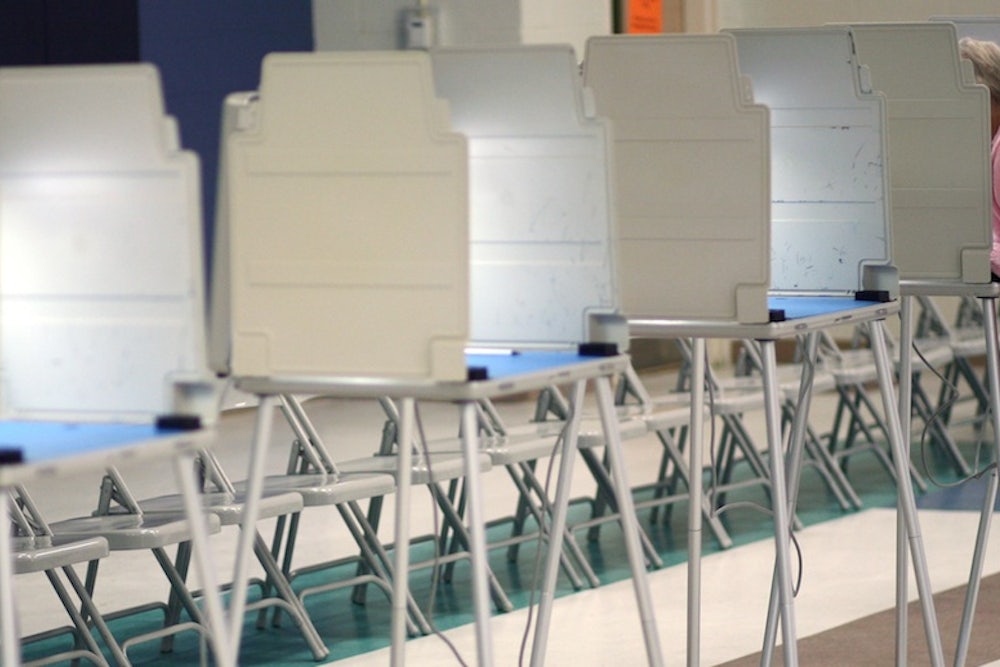One federal judge has allowed a voter ID law to take effect in Wisconsin. Another is now contemplating whether to do the same in Texas. Defenders of these laws, which exist in some form in 34 states, insist that requiring people to show government-issued identification at the polls will reduce fraud—and that it will do so without imposing unfair burdens or discouraging people from voting. In North Carolina, for example, Republican Governor Pat McCrory wrote an op-ed boasting that the measures fight fraud “at no cost” to voters.
It’s not surprising that McCrory and like-minded conservatives make such arguments. The Supreme Court under Chief Justice John Roberts has steadily weakened the Voting Rights Act and related legislation, which for generations federal official used to make sure minority voters had equal voice in the political process. But in 2008, when the Court approved Voter ID laws, the Court left open the possibility of new challenges if plaintiffs can demonstrate the laws impose a burden on would-be voters.
There are now good reasons to think the laws do exactly that.
One reason is a report, published over the summer, from Harvard Law School’s Charles Hamilton Houston Institute for Race and Justice. Researchers there complied published articles and legal testimony, in order to calculate the cost of of obtaining a government-issued identification. They included everything from the cost of waiting to the cost of traveling and obtaining documentation. Their conclusion? The costs can range anywhere from $75 to $400 per person. The study is not a comprehensive, since it examines evidence from just three states— Texas, Pennsylvania and South Carolina, which had its law blocked by the U.S. Justice Department but upheld by a District Court. But as many as 11 percent of voters don’t have a photo ID, according to the Brennan Center, and the study illustrates the challenge these people—many of them very poor—would face trying to get new identification documents. “The more it can be shown that is a substantial financial cost, the clearer it is that these laws are unconstitutional,” said Richard Sobel, author of the study.
Of course, some people would face higher costs than others. According to the study, people who move from another state can have a particularly hard time, because they’ll have trouble tracking down—and then paying for—the documentation they’ll need to get an identification card. Many states require that people present birth certificates in order to get Voter ID cards, but in at least two states, South Carolina and North Carolina, people who want a new birth certificate must present some other form of government identification. In other words, somebody would need a photo ID in order to obtain a voter ID.
Another group that can face extra costs and difficulty getting ID cards is women—specifically, women who have changed their names after marriage. A study by the Brennan Center from 2006 showed that just 48 percent of women with access to a birth certificate have access to identification with their legal name. “It's clear the costs are much much greater largely because we change our names,” Elisabeth Macnamara, president of the League of Women Voters, told me. The League of Women Voters in Wisconsin has challenged Wisconsin’s voter ID law, partly on this basis. “We are seeing courts considering the Photo ID and see how much it takes to get one.”
A separate issue is the hassle people face when they try to get Voter ID cards. “We've experienced people being treated differently depending which DMV they go to or which examiner they talk to as to whether which document is sufficient,” Bob Hall, executive director of Democracy North Carolina, said in an interview. These difficulties should strengthen legal challenges to the requirement, he said: “It does bolster the argument that it amounts to a poll tax.”
Individual voters aren’t the only ones who face extra costs because of Voter ID laws. State governments’ do, too. The report from Harvard’s Houston Center showed the laws could cost Pennsylvania between $15.75 million and $47.26 million; South Carolina’s law would cost the state between $5.9 million and $17.70 million; and in Texas, could see the costs for its law go between $26.07 million and $78.22 million. “This is a huge amount of money to get a free ID, especially when the right to vote is a right that should be exercised freely and these resources could be used to getting people out to vote,” Sobel said.
